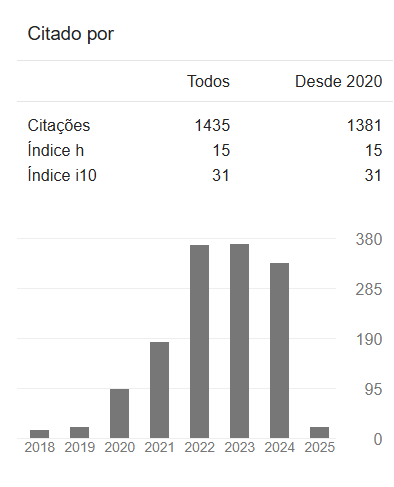THE NON-PLACE OF MODERN PHYSICS IN BNCC: THE CONSTRUCTION OF NETWORKS OF THEMES AND INTERDISCIPLINARITY
DOI:
10.23926/RPD.2022.v7.n1.e011.id1356Keywords:
National Common Curriculum Base, High School, Teaching of Physics, Modern PhysicsAbstract
This research is the result of a study about the proposal of the High School BNCC regarding the place or not of Modern Physics in this stage of schooling. The objective was to study the proposal for interdisciplinary teaching announced at the BNCC, in particular, the teaching of Physics, and to present an alternative proposal to the organization of themes that contemplates the complexity of the subjects and the interaction between disciplines and/or areas of knowledge. For this, a theoretical research was carried out on the contents of Physics in the BNCC document, building up a network of themes that could generate new articulations with other areas of knowledge. The proposal starts from themes that emerge from real needs, enhancing the greatest list of articulations, interconnections and crossings between the areas of knowledge. It is proposed to organize the pedagogical work with articulated actions among teachers, covering different areas, curricular components through interdisciplinary projects.
Downloads
Metrics
References
ALVAREZ, Gilberto. Capítulos do desmonte do ensino. In: CÁSSIO, Fernando.; CATELLI JR., Roberto. (org.). Educação é a base? 23 educadores discutem a BNCC. São Paulo: Ação Educativa, 2019, p. 41-44.
ASSOCIAÇÃO NACIONAL DE PÓS-GRADUAÇÃO E PESQUISA EM EDUCAÇÃO; ASSOCIAÇÃO BRASILEIRA DE CURRÍCULO. Ofício nº 01/2015/GR. Exposição de Motivos sobre a Base Nacional Comum Curricular. Rio de Janeiro: ANPEd/ABdC, 2015. Disponível em: https://www.anped.org.br/news/exposicao-de-motivos-sobre-base-nacional-comum-curricular. Acesso em: 30 set. 2021.
AZEVEDO, Maria Antonia Ramos de; ANDRADE, Maria de Fátima Ramos de. O conhecimento em sala de aula: a organização do ensino numa perspectiva interdisciplinar. Educar em Revista, Curitiba, n. 30, p. 235-250, 2007. DOI: https://doi.org/10.1590/S0104-40602007000200015
BARDIN, Laurence. Análise de Conteúdo. São Paulo: Edições 70, 2016.
BEHRENS, Marilda Aparecida. Paradigma da complexidade na prática pedagógica dos professores universitários: inovações epistemológicas e tecnológicas para ensinar e para aprender. In: CAVALCANTE, Maria Marina Dias et al. Didática e Prática de Ensino: Diálogos sobre a Escola, a Formação de Professores e a Sociedade. Fortaleza: EdUECE, [2015], E-book, 1270 p. Disponível em: http://www.uece.br/endipe2014/ebooks/livro4/25.%20PARADIGMA%20DA%20COMPLEXIDADE.pdf. Acesso em: 22 abr. 2021.
BEHRENS, Marilda Aparecida. Paradigma da complexidade: metodologia de projetos, contratos didáticos e portfólios. Petrópolis, RJ: Vozes, 2006.
BRASIL. Ministério da Educação. Base Nacional Comum Curricular. Educação é a Base. Brasília, DF, 2018. Disponível em: http://basenacionalcomum.mec.gov.br/images/BNCC_EI_EF_110518_versaofinal_site.pdf. Acesso em: 17 mai. 2021.
CÁSSIO, Fernando. Existe vida fora da BNCC? In: CÁSSIO, Fernando.; CATELLI JR., Roberto. (orgs.). Educação é a base? 23 educadores discutem a BNCC. São Paulo: Ação Educativa, 2019, p. 13-39.
CHIZZOTTI, Antônio. Pesquisa em ciências humanas e sociais. 2. ed. São Paulo: Cortez Editora, 2018.
FERNANDES, Jose Vieira. Saberes, competências, valores e afectos necessários ao bom desempenho profissional do/a professor/a. Lisboa: Ed. Técnicas, 2001.
FREIRE, Paulo. Extensão ou comunicação? Tradução de Rosisca Darcy de Oliveira. 8ª. Ed. Rio de Janeiro: Paz e Terra, 1985.
MENDONÇA, Erasto Fortes. PNE e Base Nacional Comum Curricular (BNCC): impactos na gestão da educação e da escola. In: AGUIAR, Márcia Angela da Silva.; DOURADO, Luiz Fernandes (org.). A BNCC na contramão do PNE 2014 – 2024: Avaliação e perspectivas. Recife: ANPAE, 2018. p. 34-37. [Livro eletrônico].
MORAN, Jose Manoel; MASETTO, Marcos Tarcísio; BEHRENS, Marilda Aparecida. Novas tecnologias e mediação pedagógica. Campinas: Papirus, 2015.
MORIN, Edgar. A cabeça bem-feita: repensar a reforma, reformar o pensamento. Tradução de Eloá Jacobina. 6a. ed. Rio de Janeiro: Bertrand Brasil, 2002.
MORIN, Edgar. Introdução ao pensamento complexo. Tradução de Eliane Lisboa. 5a ed. Porto Alegre: Sulina, 2015.
MORIN, Edgar. Os setes saberes necessários à educação do futuro. Tradução de Catarina Eleonora F. da Silva e Jeanne Sawaya. 4a ed. São Paulo: Cortez; Brasília: UNESC, 2001.
SANTOS, Wildson Luiz Pereira dos; MORTIMER, Eduardo Fleury. Uma análise de pressupostos teóricos da abordagem C-T-S (Ciência - Tecnologia - Sociedade) no contexto da educação brasileira. Ensaio Pesquisa em Educação em Ciências, Belo Horizonte, v. 2, n. 2, p. 1-23, dez. 2000. DOI: https://doi.org/10.1590/1983-21172000020202
SALLES, Virgínia Ostroski; MATOS, Eloiza Aparecida Silva Ávila de. A Teoria da Complexidade de Edgar Morin e o Ensino de Ciência e Tecnologia. Revista Brasileira de Ensino de Ciência e Tecnologia, Ponta Grossa, v. 10, n. 1, 2017. Disponível em: https://revistas.utfpr.edu.br/rbect/article/view/5687. Acesso em: 22 abr. 2021. DOI: https://doi.org/10.3895/rbect.v10n1.5687
VEIGA, Ilma Passos Alencastro; SILVA, Edileuza Fernandes da. Ensino fundamental: gestão democrática, projeto político-pedagógico e currículo em busca da qualidade. In: VEIGA, Ilma Passos Alencastro; SILVA, Edileuza Fernandes da (org.). Ensino fundamental: da LDB à BNCC. Campinas: Papirus, 2018. p. 43-67.
Downloads
Published
How to Cite
Issue
Section
License
Copyright (c) 2023 A Revista Prática Docente tem o direito de primeira publicação

This work is licensed under a Creative Commons Attribution-NonCommercial 4.0 International License.
Authors who publish in this journal agree to the following terms:
- Authors retain the copyright and grant the journal the right of first publication, with the paper simultaneously licensed under the Licença Creative Commons Attribution allows the sharing of the work with acknowledgment of authorship and initial publication in this journal.
- Authors are authorized to take additional contracts separately, for non-exclusive distribution of the version of the work published in this journal (e.g. publish in institutional repository or as a book chapter), with acknowledgment of authorship and initial publication in this journal.











